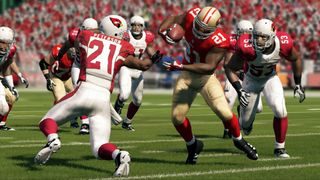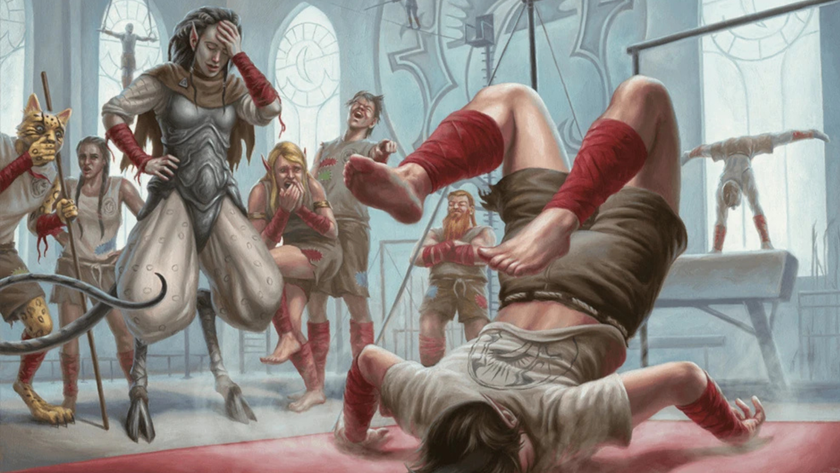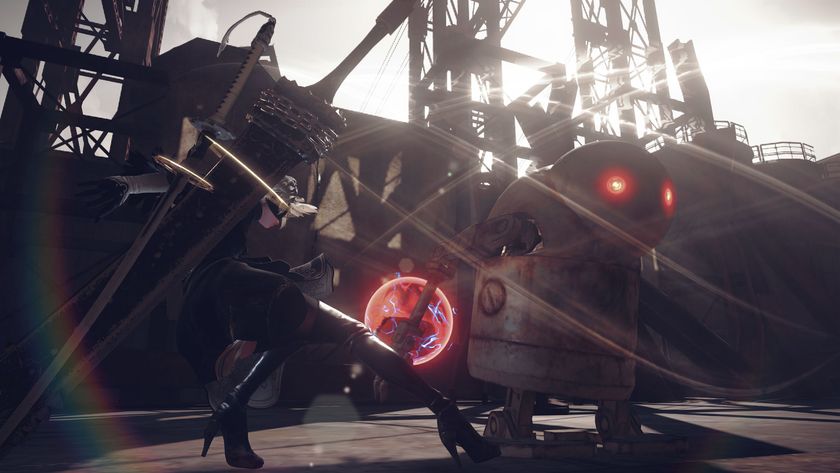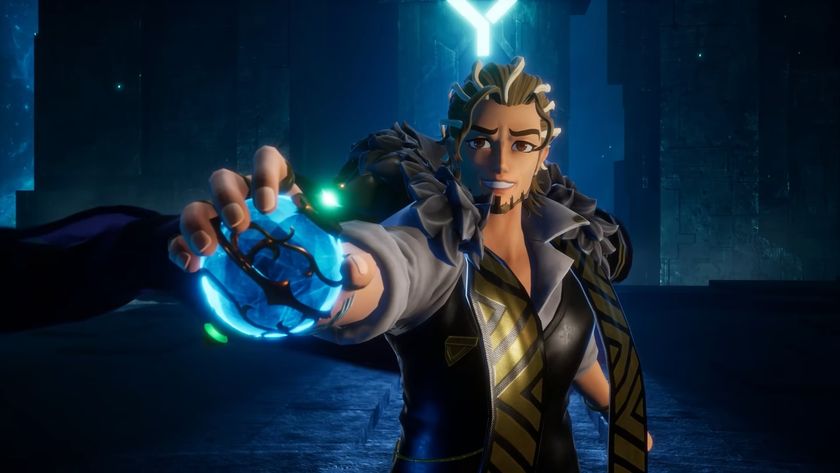The RPG is dead! Long live the RPG!
Game design always finds a way
Arizona Cardinals' Larry Fitzgerald has an Acceleration rating of 89, which means he's fast, but not as fast as the Texans' Andre Johnson, who clocks in at 93. Despite this five point discrepancy, the two wide receivers share the same overall rating, mainly because when it comes to Awareness--an important trait for a professional athlete whose job it is to be aware of his surroundings--Fitzgerald is ranked higher than Johnson. Awareness and Speed are just two of the 45 statistics every one of the 2368 players in Madden NFL 13 are rated on.
These stats might as well be Initiative and Perception, two checks D&D gamers know all too well. And Madden's not the only not-even-remotely-RPG release to co-opt defining characteristics of the role-playing genre. Take a look at Call of Duty: Black Ops II, where players earn experience for kills and level up, unlocking new abilities and weapons. Or what about Darksiders, and its use of loot and leveling? Getting a new armor upgrade in Dead Space isn’t really all that different from equipping a +3 suit of plate mail, is it?

When we met to discuss our Game of the Year awards and landed on the role-playing game category we realized that, technically, nearly every game that came out this year qualified. Far Cry 3 contains experience, loot, skills, abilities, and crafting. Dishonored is full of story elements we typically associate with role-playing games (not to mention loot, skills, abilities, and so on). Heck, look at the strategy-centric XCOM, a game so entrenched in RPG mores that we couldn't help but actually categorize it as an RPG. It might as well be Dungeons & Dragons: Alien Defense Edition.
That opens up another point. The games we actually included in our RPG of the year section were also almost entirely hybrids. Mass Effect 3 has as much to do with shooters as it does epic storylines. Guild Wars has loot in abundance, but the combat is as engaging as any action game. Paper Mario is a hilariously well-written platformer. And, again, XCOM, where your squad can be leveled up and equipped with items, and combat is filled with modifiers and terrain rules that eventually boil down to a roll of the die.
And it’s weird, because just as the number of games with RPG elements rise, the number of “true” RPGs is dwindling--and also becoming less convincing. Final Fantasy XIII-2 was lauded by many, but it still didn’t win over anyone jaded by the new direction of the series. Or look at the much-anticipated Diablo III, whose successes were overshadowed by a cocktail of technical issues and a large step away from the stat-heavy gameplay of the series' past. And that's to say nothing of its lack of innovation--or even iteration--on Diablo II's gameplay.

In fact, some of the best true RPGs to come out this year are actually remakes or localizations from years past. Why are so few RPGs in development? How is it that the best-selling games of the year can include huge RPG elements while actual RPGs are struggling to even get made?
But that's exactly the reason. RPGs are dying because, at this point, everything is an RPG. The basic, boilerplate, turn-based RPG is largely a thing of the past because developers have discovered that the things most people love about them--leveling, loot, compelling stories, and the like--can be transplanted into other genres with great success. If anything, RPG systems operate better as a complement to other genres. Sure, you’ll still get occasional Pokemon and Final Fantasy games that’ll remind you of afternoons spent grinding against random encounters, but the days of developers throwing $50 million into a turn-based game? They’re pretty much over.
Sign up to the 12DOVE Newsletter
Weekly digests, tales from the communities you love, and more
While I'm sad to see traditional RPGs fade into obscurity, I'm happy to see how much more influential its become. The genre hasn't really gone away, but splintered off, enhancing almost every major game released every year. Next year's BioShock Infinite has numbers flying off the heads of shot enemies, and Tomb Raider includes some elements that, 15 years ago, wouldn't have typically been found in western action games.

Now every game you play, regardless of genre, is built with the same framework that made Final Fantasy so popular for the NES. Developers of shooters have realized that the satisfaction of a headshot is amplified by a “Level up!” notification. Adventure game developers have admitted that there’s more reward in equipping a newly-looted item than simply being handed one by a boss’s death. Even the crews responsible for creating sports games approach players with the same mindset that you take with you when rolling up a new Dungeons & Dragon character. RPGs haven’t lost, they've taken over. They've won.
You know that kid at parties who talks too much? Drink in hand, way too enthusiastic, ponderously well-educated in topics no one in their right mind should know about? Loud? Well, that kid’s occasionally us. GR Editorials is a semi-regular feature where we share our informed insights on the news at hand. Sharp, funny, and finger-on-the-pulse, it’s the information you need to know even when you don’t know you need it.
Hollander Cooper was the Lead Features Editor of 12DOVE between 2011 and 2014. After that lengthy stint managing GR's editorial calendar he moved behind the curtain and into the video game industry itself, working as social media manager for EA and as a communications lead at Riot Games. Hollander is currently stationed at Apple as an organic social lead for the App Store and Apple Arcade.

The Baldur's Gate 3-themed Stardew Valley mod that Larian boss Swen Vincke called "amazing" gets DMCA'd by D&D publisher Wizards of the Coast

After PlayStation boss praises Nier Automata as a savior for Japanese games overseas, Yoko Taro says he was specifically told to focus on Japan because it wouldn't fly overseas











